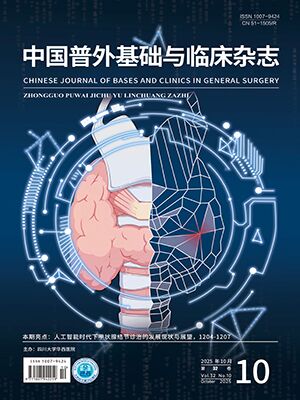| 1. |
Chen B, Zhou Y, Yang P, et al. Safety and efficacy of fish oil-enriched parenteral nutrition regimen on postoperative patients undergoing major abdominal surgery:a meta-analysis of randomized controlled trials. JPEN J Parenter Enteral Nutr, 2010, 34(4):387-394.
|
| 2. |
张维康, 龙跃平, 陈俊华.ω-3鱼油脂肪乳对胃肠道恶性肿瘤患者术后恢复的作用.临床外科杂志, 2007, 15(9):606-608.
|
| 3. |
Liang B, Wang S, Ye YL, et al. Impact of postoperative omega-3 fatty acid-supplemented parenteral nutrition on clinical outcomes and immunomodulations in colorectal cancer patients. World J Gastroenterol, 2008, 14(15):2434-2439.
|
| 4. |
魏玉哲, 宋洪江, 王佳, 等.ω-3多不饱和脂肪酸在老年胃癌病人术后肠外营养中的应用.肠外与肠内营养, 2009, 16(6):328-331.
|
| 5. |
刘鑫, 辛福泽, 张彦波, 等.ω-3鱼油脂肪乳对胃肠道肿瘤病人术后免疫功能和炎性反应的影响.肠外与肠内营养, 2009, 16(5):280-282, 285.
|
| 6. |
陆承, 王文跃, 彭维朝, 等.鱼油脂肪乳对胃肠道恶性肿瘤病人术后营养状况和体液免疫的影响.肠外与肠内营养, 2009, 16(6):324-327.
|
| 7. |
Jiang ZM, Wilmore DW, Wang XR, et al. Randomized clinical trial of intravenous soybean oil alone versus soybean oil plus fish oil emulsion after gastrointestinal cancer surgery. Br J Surg, 2010, 97(6):804-809.
|
| 8. |
夏俊, 熊奇如, 钱叶本, 等.ω-3鱼油脂肪乳在胃癌患者术后肠外营养中的应用.安徽医科大学学报, 2011, 46(10):1105-1106.
|
| 9. |
薛平慧, 刘君, 林松.ω-3鱼油脂肪乳对大肠癌患者术后机体免疫的影响.华南国防医学杂志, 2011, 25(2):138-139.
|
| 10. |
郑伟, 王宇.ω-3鱼油脂肪乳在结直肠恶性肿瘤病人术后肠外营养中的作用.肠外与肠内营养, 2011, 18(3):129-131, 135.
|
| 11. |
Zhu MW, Da-Nian T, Hou J, et al. Impact of fish oil enriched total parenteral nutrition on elderly patients after colorectal cancer surgery. Chin Med J, 2012, 125(2):178-181.
|
| 12. |
郭健, 周峰, 余震, 等.ω-3多不饱和脂肪酸对胃癌患者术后免疫功能及术后疲劳综合征的影响.中华临床营养杂志, 2012, 20(6):382-383.
|
| 13. |
黄建强, 郑权, 赵建辉, 等.鱼油脂肪乳对胃肠道肿瘤患者术后细胞免疫及炎症反应的影响研究.重庆医学, 2013, 42(35):4289-4291.
|
| 14. |
Long H, Yang H, Lin Y, et al. Fish oil-supplemented parenteral nutrition in patients following esophageal cancer surgery:effect on inflammation and immune function. Nutr Cancer, 2013, 65(1):71-75.
|
| 15. |
Wei Z, Wang W, Chen J, et al. A prospective, randomized, controlled study ofω-3 fish oil fat emulsion-based parenteral nutrition for patients following surgical resection of gastric tumors. Nutr J, 2014, 13:25.
|
| 16. |
黄剑, 方强.ω-3鱼油脂肪乳对食管恶性肿瘤患者术后免疫功能和炎性反应的影响.浙江医学, 2014, 36(2):148-150.
|
| 17. |
胡国强, 陈威.含ω-3鱼油脂肪乳的肠外营养液对胃肠道肿瘤病人术后免疫与炎性因子的影响.肠外与肠内营养, 2015, 22(1):16-19.
|
| 18. |
Zaloga GP. Parenteral nutrition in adult inpatients with functioning gastrointestinal tracts:assessment of outcomes. Lancet, 2006, 367(9516):1101-1111.
|
| 19. |
Gramlich L, Kichian K, Pinilla J, et al. Does enteral nutrition compared to parenteral nutrition result in better outcomes in critically ill adult patients? A systematic review of the literature. Nutrition, 2004, 20(10):843-848.
|
| 20. |
Peter JV, Moran JL, Phillips-Hughes J. A meta analysis of treatment outcomes of early enteral versus early parenteral nutrition in hospitalized patients. Crit Care Med, 2005, 33(1):213-261.
|
| 21. |
Mayer K, Seeger W. Fish oil in critical illness. Curr Opin Clin Nutr Metab Care, 2008, 11(2):121-127.
|
| 22. |
Fan YY, McMurray DN, Ly LH, et al. Dietary (n-3) polyunsaturated fatty acids remodel mouse T-cell lipid rafts. J Nutr, 2003, 133(6):1913-1920.
|
| 23. |
Zeyda M, Szekeres AB, Säemann MD, et al. Suppression of T cell signaling by polyunsaturated fatty acids:selectivity in inhibition of mitogen-activated protein kinase and nuclear factor activation. J Immunol, 2003, 170(12):6033-6039.
|
| 24. |
Nohé B, Ruoff H, Johannes T, et al. A fish oil emulsion used for parenteral nutrition attenuates monocyte-endothelial interactions under flow. Shock, 2002, 18(3):217-222.
|




